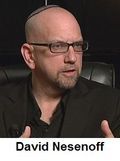 HonestReporting's social media editor, Alex Margolin, contributes occasional posts on social media issues. He oversees HonestReporting on Facebook.
HonestReporting's social media editor, Alex Margolin, contributes occasional posts on social media issues. He oversees HonestReporting on Facebook.
Do bloggers and citizen journalists have the chops to replace traditional news reporters? The perennial question marking the shift from old to new media returned with a fury last week.
Ask veteran White House correspondent Helen Thomas, who was brought down by a self-styled reporter with a camera. Despite 50 years in the field, Thomas suddenly “retired” under pressure after a video of her telling Jews to “go home” to Poland and Germany received enormous exposure on the Internet.
Or maybe ask the editors at Reuters, who were caught editing knives out of the hands of “peace activists” in photos from the flotilla to Gaza. The scoop on the controversial edits first appeared on Charles Johnson’s blog, Little Green Footballs.
These two stories – exposes of icons of traditional media broken by members of the new media – were the biggest Israel-related news items last week. The quick and nimble “amateurs” of the digital age outhustled their “professional” colleagues to capture the biggest headlines. Along the way, they revealed several advantages of the Internet, particularly over the print media.
First, Internet news sites can publish short burst of information and update as the facts emerge. Second, digital content is designed to be shared across the Internet. If a story catches fire – goes viral – it can be seen by millions of people before the newspapers even hear about it.
So how do traditional reporters compete? By embracing their role as the gatekeepers of “official” information. Traditional reporters don’t get scoops by bringing a camera to a White House event, as Rabbi David Nesenoff did with the Helen Thomas video; they cover the event itself and speak to the officials behind it. They are the channel through which leaders of government and industry reveal their policies. As such, they carry the weight of authority.
But with the increasingly scrappy bloggers and citizen journalists fighting for news scoops, a new set of checks and balances is emerging in the news industry. Traditional media provides the voice of the establishment and the new media serves as the voice of the people. And judging by last week’s performance, traditional media has more to worry about than its dropping circulation figures. Its very institutions are increasingly under attack.
Previously in Alex's series: The Making of an Icon

